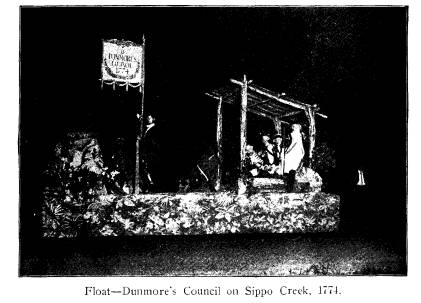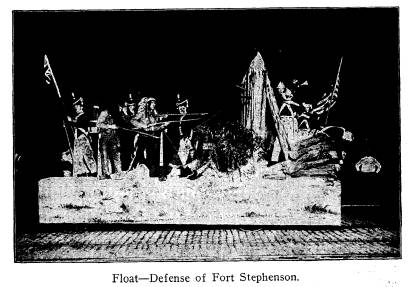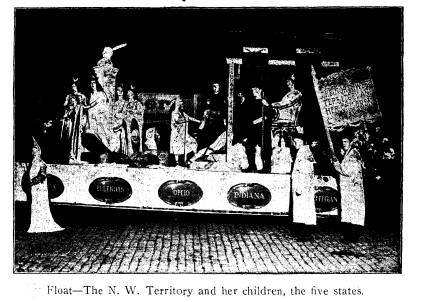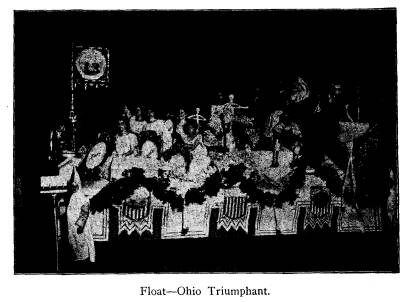Ohio History Journal
|
452 Ohio Arch. and Hist. Society Publications.
For God shall dwell among us, and men shall say The former bitter things are passed away; Gone are our strifes and banished all our fears, For here is love that wipes away all tears; Here is the rest for which our souls have striven; This is the city that came down from heaven.
WHY OHIO IS GREAT. At the dinner participated in on Tuesday, August 27, at the Southern Hotel, by the Descendants of Ohio Governors, the |
|
|
|
following address was made by Prof. Dean C. Mathews, of West- ern Reserve University, Cleveland, Ohio. Mr. Mathews is a great-grandson of Samuel Huntington, third governor of Ohio, 1812-1814. MR. MATHEW'S ADDRESS. Why is Ohio great? We may say that Ohio is the result of an idea, of fortunate circumstances and favoring physical conditions. The idea of individual human freedom, granted by |
The Ohio-Columbus Centennial. 453
the Magna Charta, reinterpreted by the
Constitution of the
United States and applied in the
Ordinance of 1787; the circum-
stances arising at the close of the great struggle for American
independence; the physical gifts, of
land that was good and nat-
ural resources that were rich and an
economic advantage derived
from situation on transcontinental
waterways of lake on the
north and river on the south, great
paths through which the peo-
ple of the continent presently should
pass. For the westward
march of civilization was to be by way
of Ohio. All these were
instruments. Ohio owes her greatness to
something more than
these. She owes her greatness to her
men!
From the Pennsylvania of William Penn
and of the Ger-
man, from the Massachusetts and
Connecticut of the Puritan,
from the Virginia of the Cavalier, came
Ohio's pioneers. Some
came from New York on the north and from
Kentucky on the
south but these were a vanguard from the
commonwealths al-
ready named. Ohio's earliest citizenry
was representative of the
best vigor of the American continent. As
an Ohio historian
(Alfred Mathews) has said: "Ohio
was settled by the people
of the United States.. . . Her's was the
first territory to be
representative of the entire
people."
Who were the leaders among these people?
Emerson says: "It is natural to
believe in great men. The
world is upheld by the veracity of good men; they make the
earth wholesome ....
When nature removes a great man,
people explore the horizon for a
successor; but none comes, and
none will. In some other and quite
different field the next man
will appear."
It is grateful recognition of the wise,
patriotic and prophetic
labors of the fathers that we, sons and
daughters, their descen-
dants of several generations, are
gathered here today.
We may not speak in detail of each of
the more than two
score of men who have filled the
Governor's office. To do so
would require the chronicles of a
historian or the extraordinary
personal acquaintance of one like the
honored William McClin-
tick, of Chillicothe. Some of you will
recall Mr. McClintick's
unusual address delivered ten years ago
on the occasion of the
centennial anniversary of the signing of
the State Constitution.
454 Ohio Arch. and Hist. Society Publications.
You will then remember this patriarch's
statement that he had
personally known all the governors of
the state, from Edward
Tiffin, the first governor, and Thomas
Worthington, to the then
governor, George Nash, with the
exception of Samuel Hunting-
ton, Return Jonathan Meigs, Jr., and
Ethan Allen Brown. As
their descendants, we may merge our
individual loyalties in a gen-
erous appreciation of all. Each proved
himself the strong man
for his time.
Fortunate in her later governors, the
State was peculiarly
fortunate in her first executive.
Doctor, clergyman and lawyer,
Edward Tiffin sensed the spirit of his
constituents, appreciated
the state's opportunity and anticipated
the future with the mind
of a prophet. The promise of what he was
to be in the North-
west Territory is indicated by a letter
written in 1798 by Presi-
dent Washington to Governor St. Clair:
"SIR:-Mr. Edward Tiffin solicits an
opportunity in the territory
Northwest of the Ohio.
"The fairness of this character in
private and public life, together
with a knowledge of law, resulting from
close application for a con-
siderable time, will, I hope, justify
the liberty I now take in recom-
mending him to your attention. Regarding with due attention the
delicacy as. well as the importance of
the character in which I act, I
am sure you will do me the justice to
believe that nothing but the
knowledge of the gentleman's merits,
founded upon a long acquaintance,
could have induced me to trouble you on
this occasion.
"With sincere wishes for your
happiness and welfare, I am, etc., etc.,
"GEO. WASHINGTON."
This is believed to be the only letter
of recommendation for
public position written by President
Washington.
Tiffin became Speaker of the Territorial
Legislature, Presi-
dent of the First Constitutional
Convention, and the first gover-
nor of the state. As Governor he was
elected and later reelected
by the unanimous vote of the people, an
honor not bestowed on
any of his successors. His inaugural
address urged measures for
popular education, the opening of
wagonroads, the improvement
of waterways, and means of defense
against hostile tribes of
Indians. Referring to the interference
by Spanish settlers of the
lower Mississippi with free navigation
of that river he said, ad-
dressing the Legislature:
|
The Ohio-Columbus Centennial. 455
"It would be as impossible to prevent the Mississippi River from discharging its waters into the ocean as to prevent the people of the West from asserting their natural right to force, with that stream, the fruits of their industry to every part of the world." Thomas Jefferson, as Secretary of State, in secret instruc- tions to the United States States Minister at Madrid, had written: "Impress the Spanish ministry thoroughly with the necessity of an early settlement of this matter, for it is impossible to answer for the forbearance of our western citizens." Governor Tiffin, in a subsequent message, after congratu- lating the State of Ohio and the people of the West upon the |
|
|
|
complete purchase of the Louisiana Territory from France, and after reciting that Spanish authorities and residents on the lower Mississippi refused to acquiesce and were still harassing Ameri- can traders and impeding the navigation of the river, urged the Legislature of Ohio to provide that "five hundred of our best disciplined and best officered militia be held in readiness to go down the river should the Spaniards either refuse or delay to give up Louisiana agreeably to the treaty." |
456 Ohio Arch. and
Hist. Society Publications.
Governor Tiffin's prophetic vision again
was demonstrated
in the matter of the Aaron Burr
conspiracy. Some time before
the national government realized the
situation the alert Ohio ex-
ecutive had discovered the facts. These
he laid before the Legis-
lature, meeting behind closed doors. The
attitude of the State
was unhesitant and the conspiracy was
destroyed before the
official warning letters addressed by
the President to the governor
of Ohio and Kentucky were received. This
prompt action was
publicly acknowledged by President
Jefferson who, in a letter to
Congress, wrote as follows:
"Governor Tiffin and the
Legislature of Ohio, with a promptitude,
an energy and patriotic zeal which entitle
them to a distinguished place
in the affections of their sister
states, effected the seizure of all their
boats, fifteen in number, provisions and
other preparations within their
reach and thus gave a first blow,
materially disabling the enterprise in
its outset."
Samuel Huntington, nephew and adopted
son of the Sam-
uel Huntington of Connecticut who was
President of the Con-
tinental Congress, a Master of Arts from
Yale and a lawyer by
profession, had come to the Northwest
Territory upon the invi-
tation of Governor St. Clair. One of the
representatives of the
Western Reserve in the Constitutional
Convention, he became
also a member of the first senate and
was elected to the first
Supreme Bench. Because of the light
thrown upon conditions
prevailing at the time we may be
pardoned for introducing pres-
ently direct quotations from letters to
which we have personal
access. The Supreme Court held its
sessions in the different
settlements, in circuit. Travel for the supreme judges, as for
everyone else, was by horseback, by the
wagonroads and bridle-
paths cut through the woods. But in a
letter written from Chilli-
cothe, November 8, 1808, after writing
of political conditions,
Mr. Huntington inserts this less serious
paragraph:
"My silk stockings. I should be
glad if you could conveniently
send them, also my cotton gloves which
were forgotten. Do not send
them unless by some trusty person coming
directly here."
Evidently the good housewife at
Painesville sent the finery
safely through for to a letter written
at Chillicothe on Decem-
ber 29, following, Mr. Huntington added this:
"P. S. The stockings and gloves
came, safe."
The Ohio-Columbus Centennial. 457
Strange contrast, - silk stockings, buckles, gracefully shaped
coat with white ruffles at neck and
wrists, - strange contrast to
those conditions which everywhere
surrounded in the far-ex-
tending woods. The records of the
Assembly show that many a
day was occupied by the consideration of
bills for the ridding of
the country of wolves and panthers.
Judge Huntington him-
self, when making the trip from his home
at Painesville to
Cleveland alone, at night, on horseback,
was attacked by a pack
of wolves.
Those were the days of "wars and
rumors of wars." From
his home on Lake Erie to which he had
retired at the close of his
term of office as Governor, (1808-1810),
Mr. Huntington wrote,
June 3, 1812:
"It seems to be the general opinion
that war is inevitable, but I
think it will be a continuance of the
paper war and that more ink than
blood will be shed in it......... The
blustering system has so long been
in use that we do not regard a little
more of it as a sure indication of
hostilities."
But the following is from a letter which
on August
26, 1812,
he wrote to his wife from Ravenna:
"It was found necessary for some
person to go direct to Wash-
ington City to procure Arms, &c, and
the Council of War appointed
me for that purpose - - * * * & I consider it my duty in this
emergency to go -- despatch was necessary & I could not
go home
without losing a day. I accordingly set
out yesterday noon with what
preparation I could make in 2 hours. I
must be in Washington in a
week and shall not probably stay there
more than 2 days - - it will
take me a week more to return and I
shall return by the way of Cleve-
land - If Frank (their son) is called for he must go: - I hope
with George and the little boys you will
suffer but little inconvenience
until I return. * * *
"The Indians have all gone down to
attack Fort Wayne and from
there they will proceed to Fort
Vincennes on the Wabash so that for
five or six weeks they will find enough
to do in that quarter and
before that time the troops will arrive
from the South & until then it
will be practical to keep our militia
ready for them between Cleveland
and Miami. There is no cause of
apprehension this side of Huron
River and none there but from a few
stragglers who may steal the
Cattle that are left, when they find the
People have gone off- - I
hope the people at Grand River will not
be scaring one another. One
wagon going off starts fifty more.- Col. Cass is going on with me
and we are in great haste."
|
458 Ohio Arch. and Hist. Society Publications.
The trip to Washington was successful. Government aid was secured for the prosecution of the war. Huntington was made Paymaster of the Northwest Army with rank of Colonel. Thenceforth he spent much time in the field. Conditions were bad. From an army camp at Lower Sandusky, July 12, 1813, he wrote home: "The troops are very sickly - great numbers die daily. If they remain at Fort Meigs or this place until the last of September there will not be one man to help another. * * *. The Indians are con- |
|
|
|
stantly about us watching an opportunity to cut off small parties. They killed seven persons within plain sight of the garrison." In a letter addressed to his son-in-law, Dr. John H. Math- ews, of Painesville, January 3, 1814, he wrote: "From what information we can obtain the Enemy is marching to attack us either here or at Sandwich & Madden. * * * The cer- tainty of inhuman treatment from British & Indians, the retaliatory system adopted, and the exasperated state of mind of both parties on this frontier at this time, all combine to make both desperate, and to inspire a resolution in our troops never to surrender. * * * The |
The Ohio-Columbus Centennial. 459
folly of withdrawing our forces from
this district & sending them be-
yond the reach of intelligence in any
possible time for relief, will soon
appear - conquering Canada by proclamation and holding it by re-
treating out of it are parts of the same
system of warfare."
From Chillicothe he wrote, November 8,
1814:
"We arrived here on the 6th after
traveling almost constantly in
the rain. * * * I can obtain no money
for the pay of the army.
The Bankers do no business & the
silver is banished (from) the
Country. I shall remain here until I can
hear from Washington. From
the news received since I left home it
appears we are to have a long
and bloody war, that the taxes are to be
doubled & the Militia are to
be called in some shape or other - how
we are to get money, nobody
can tell. In this gloomy state of things
we must be prepared to make
great sacrifices and we must make them
or give up all of our rights &
perhaps, the property on which we
subsist. If the Country is united
- we shall do well at last."
And again:
"* * * But I ought to keep home out
of my head. It distracts
me from doing the duties of my office. It must enter my mind only at
certain times, & never when on
business."
Return Jonathan Meigs, Jr., a native of
Connecticut, a grad-
uate of Yale, a member of the
Territorial Legislature, a judge
of the first Supreme Court of the State,
was twice elected to the
executive office. On December 9, 1812
Governor Meigs appeared
in person before the two Houses of the
Legislature and his annual
message, which was startling in its
terms, being the first official
notification of the Declaration of War
against Great Britain.
The Legislature was asked to strengthen
the arm of the national
Government and the response was
instantaneous.
The impressive part which Ohio took in
that war is evidenced
by the fact that this state alone
furnished 24,000 soldiers of all
arms, being 33 per cent of the entire
male population above
twenty-one years of age. In a later day,
after another war, an
Ohio governor and President of the
United States (Rutherford
B. Hayes) declared: "God loves Ohio
or he would not have given
her such a galaxy of heroes to defend
the nation in its hours of
trial."
It is of interest to us today to note
that it was in Governor
Meigs' administration that a site on
"the lands of John and Peter
460 Ohio Arch. and Hist.
Society Publications.
Sells, on the West bank of the Scioto
River, four and three-
fourths miles west of the town of
Worthington," was selected
as the permanent seat of Government.
During the administrations of Thomas
Worthington, who
had served in the Territorial
Legislature and as one of the first
United States senators from Ohio, of
Ethan Allen Brown, a
judge of the state Supreme Court and
later elected to the United
States Senate, of Allen Trimble, seven
times elected Speaker of
the State Senate, of Jeremiah Morrow, a
member of the Con-
stitutional Convention, the first State
Legislature, a member of
the national House and Senate and
declared by Governor Ander-
son to have been "the one ablest
and best of all the governors,"
the National Road, and state roads were
built, the state canal
system was completed, and the public
school system extended.
Duncan McArthur third of Chillicothe's
four governors, of
brilliant record in the Indian wars, who
had resigned from a
public position to enlist as a private
in the War of 1812, but by
conspicuous service became a
Brigadier-General of the regular
army, was the last of the "pioneer
governors."
During the administrations of these men
the newly organized
state had taken an important place among
the commonwealths, the
frontier had been subdued, a treasonable
conspiracy had been
quashed, a war whose brunt had fallen on
this outlying people
had been waged and won, state and
national turnpikes and a
canal system had been constructed. Caleb
Atwater, in his Ohio
History, written at about this time,
says: "It is honor enough
for any common man to be a good and
worthy citizen of Ohio-
travel where he may in the Union."
With the administrations of the latter
governors of the
First Constitution, and of the period
immediately preceding the
Civil War, we are familiar. The names of
the great "War Gov-
ernors" and of those who have
served since the Civil War are
household names. The earlier and later
governors of Ohio have
served as Presidents of the United
States, Judges of the Supreme
Court of the United States, Senators of
the United States, Mem-
bers of the Cabinet of the United States
and as Foreign Repre-
sentatives of the United States. Of
their patriotic services we,
|
The Ohio-Columbus Centennial. 461
their descendants must speak with the emphasis of understate- ment. Again we quote Emerson: "Within the limits of human education and agency, we may say great men exist that there may be great men. * * * It is for man to tame the chaos; on every side, whilst he lives, to scatter the seeds |
|
|
|
of science and of song, that climate, corn, animals, men, may be milder, and the germs of love and benefit may be multiplied." "God of the prophets! bless the prophets' sons; * * * Make their hearts awake To human need; their lips make eloquent To assure the right, and every evil break. O mighty age of prophet kings, return! God of the prophets! bless the prophets' sons!" |



